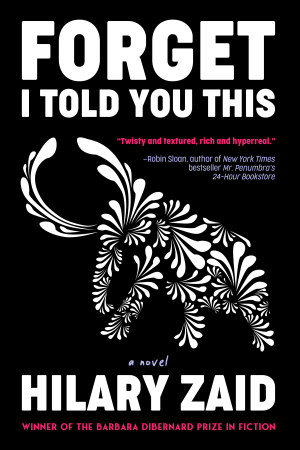This is a novel about women: mothers, daughters, grandmothers and lovers — their stories told through intertwined narratives of queer and Jewish memory. The year is 1997, just before legal same-sex marriage began to seem possible in the United States. The story’s protagonist, Ellen, and her girlfriend Francine have decided to get married anyway, but find themselves without precedent, unsure what makes a lesbian marriage a marriage. Meanwhile Ellen, who works for a nonprofit recording oral history interviews with Holocaust survivors, becomes fascinated with a mysterious client, Anya, to whom she feels drawn at first by memories of her beloved grandmother and then by a suspicion that Anya has an unspoken lesbian past of her own.
The novel hinges on things left unspoken: Ellen’s narration returns several times to the motif of the evil eye and the old folk belief that to speak joy out loud is to invite its destruction. This unwillingness to speak either of joy or grief is what Ellen feels is her deepest connection to a Jewish past. Her family, in America since the nineteenth century, have assimilated to the degree that she worries not only about how her parents will react to her marrying a woman, but also that they might think the ceremony is “too Jewish.”
In planning a wedding that both breaks with tradition and needs the strength of tradition to bolster it, Ellen seems to feel rootless; it’s this rootlessness that draws her to Anya. Not looking for a lesbian Jewish past, not even considering the possibility that she might find one, Ellen stumbles upon one all the same, a story living in the silent spaces between the things that Anya says out loud. Anya crucially never speaks the whole truth, instead implying it through strategic changes of subject and careful choice of words.
It is an unspoken connection between queer women, across generations, that allows Ellen to give voice to what Anya does not say. A clandestine search for the woman from Anya’s past seems to draw Ellen, paradoxically, through fear of rootlessness toward hope for the future. Uncovering Anya’s truth helps her speak her own truth aloud.
The novel begins with the shattering of families — the death of Ellen’s grandmother, her clients’ memories of the Holocaust — and ends with the building of a new family, three generations of gay women brought together in celebration. The discovery of Anya’s impossible past allows Ellen to imagine, and then create, her own impossible future with Francine. A story that started in loneliness and melancholy ends in tears of joy, all of the secrets spread out in the sunlight like the hand-quilted chuppah beneath which Ellen and Francine are married.
Sacha Lamb (@sachalamb.author on Instagram) explores gender, sexuality, and disability through historical fiction centering Jewish mythology and folklore. Their debut, When the Angels Left the Old Country, is a Printz Honor book and Stonewall and Sydney Taylor award winner. Their second novel, The Forbidden Book, is a Sydney Taylor Honor book and a Boston Globe Best of the Year pick for 2024. A 2018 Lambda Literary fellow, Sacha has a degree in Library and Information Science from Simmons University. They live in New England with a miniature dachshund mix named Anzu Bean.




